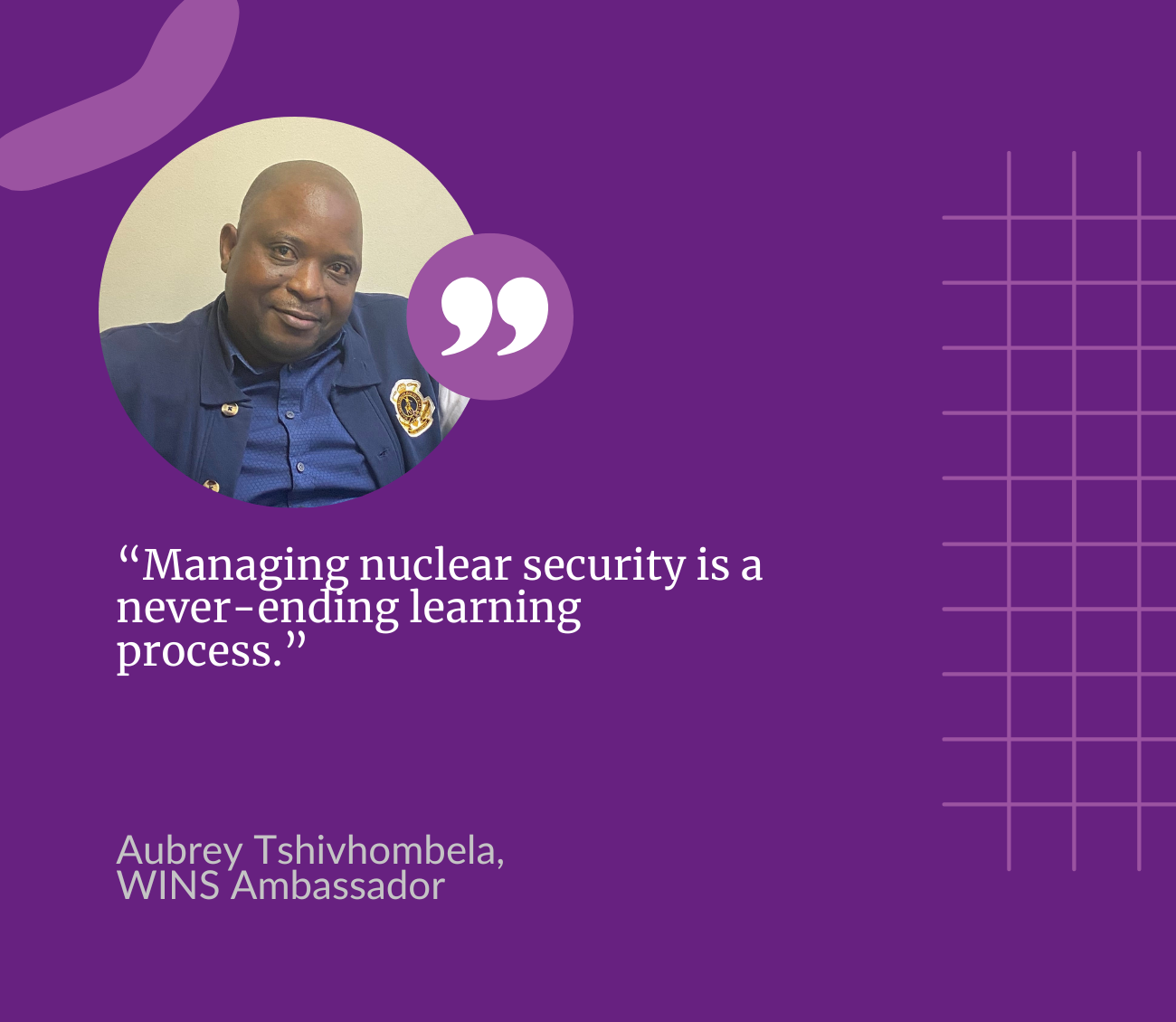Aubrey Tshivhombela is a Senior Inspector in the Compliance Assurance and Enforcement function at Necsa (South African Nuclear Energy Corporation). He speaks about the importance of ongoing professional development, managing security in the face of dynamic threats, and the importance of a network in the security sector.
What was your elective? Why did you choose it?
As a Senior Inspector in the Compliance Assurance and Enforcement function, I chose nuclear security regulation, with the main objective being to ensure compliance and enforcement of safety and security requirements. I wanted to understand the development of a legal and regulatory framework for nuclear security, as well as clarity on roles and responsibilities at the national level (responsible ministry) and those of a licensee (operator). It is much easier to implement and continuously improve systems put in place to support the peaceful use of nuclear and other radioactive material if one understands how they came about and their ultimate objective.
What inspired you to become a WINS Academy Ambassador?
My journey with WINS thus far has been an eye opening one; it has been a continuous learning curve which showed me the fundamentals of nuclear security. After successfully completing certain modules, such as Nuclear Security Governance and Nuclear Security Regulation, I can now say with confidence that I understand nuclear security concepts on an intuitive level; it comes naturally to me. The modules provided me with a structured way of thinking about nuclear security and security in general. Continuous learning through the Nuclear Security Programme module, which I’m currently enrolled in, will deepen my understanding of nuclear security.
Global and regional events such as war and terrorism change the dynamics of nuclear security, therefore strengthening nuclear security culture becomes critical and it requires a certain level of awareness within the organisation and country as well as globally. I see this exposure to WINS as an opportunity to drive nuclear security culture and share this experience with my colleagues, with the hope of changing their perspective on nuclear security. I also hope to encourage my colleagues to enrol in nuclear security modules through the WINS Academy and participate on WINS workshops by bringing these benefits to them and getting their buy in.
“The [WINS Academy] modules provided me with a structured way of thinking about nuclear security and security in general.”
What advice do you have for current WINS Academy learners or those considering enrolling?
There is more to nuclear security than just physical security. People who are not in the security space might think nuclear security is not their responsibility and therefore has nothing to do with their daily activities. That was my attitude prior to enrolling in the WINS Academy. My view on nuclear security completely changed after my first module. There is a phrase, “You don’t know what you don’t know.” This phrase became a reality to me after enrolling in the WINS Academy.
Enrolling in the WINS Academy is no-brainer, however, many people are not aware of this organisation as well as the wealth of information it holds, and being recognised as a nuclear security professional is an added bonus.
How has your WINS Academy training shaped your understanding of nuclear security threats and risks?
My WINS Academy training helped me understand the importance of continuously assessing and improving your nuclear security strategy since the threat is always evolving. While previously I did not perceive the threat as a real risk, exchanging information through WINS has helped me change this attitude. It has made me realise how important it is to guard against complacency. Unlike chemical safety, where one understands the behaviour of a chemical under certain environment/conditions, human behaviour is different. It is difficult to predict how a person will behave under certain conditions/environment, which in turn makes managing nuclear security a never-ending learning process.
“It is difficult to predict how a person will behave under certain conditions/environment, which in turn makes managing nuclear security a never-ending learning process.”
How has access to the Alumni Network benefited you?
By connecting me with people across the globe and even in my home country, with whom I wouldn’t have interacted if it weren’t for the Alumni Network. The nuclear industry is a specialised industry, so it is sometimes difficult to find someone who understands your line of business. Talking to a peer who is facing similar issues as you is helpful. Therefore, being able to share the challenges experienced and how they managed them is useful.
From Necsa:
How has your organisation benefitted from Aubrey achieving Certified Nuclear Security Professional status?
As a Senior Inspector in the Compliance Assurance and Enforcement function, the information and experience brought through continued learning in the nuclear security field and certification augments the knowledge available to the Necsa Group to continue to improve its planning, response and implementation of nuclear security as well as the integration with nuclear safety and the overall compliance culture of the organisation.
What role does WINS certification play in your institution’s professional development programme?
It allows me to improve my inputs and add value to my current inspections tasks as well as providing insights for the investigation of any nuclear events and their impact on nuclear security. Unfortunately, our company does not currently have a professional development programme in the nuclear security field, but this certification allows me to build my expertise to further in my career should the opportunity arise.
